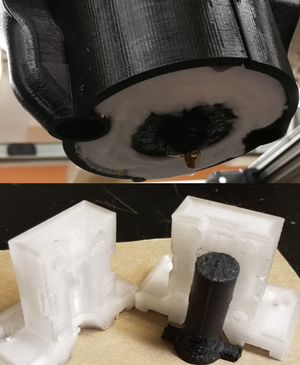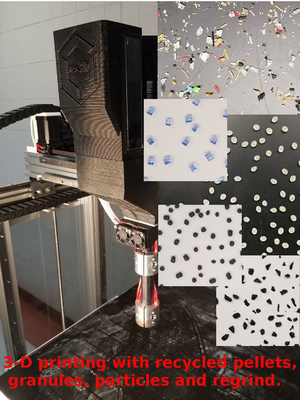
Past work has shown that particle material extrusion (fused particle fabrication (FPF)/fused granular fabrication (FGF)) has the potential for increasing the use of recycled polymers in 3D printing. This study extends this potential to high-performance (high-mechanical-strength and heat-resistant) polymers using polycarbonate (PC). Recycled PC regrind of approximately 25 mm2 was 3D printed with an open-source Gigabot X and analyzed. A temperature and nozzle velocity matrix was used to find useful printing parameters, and a print test was used to maximize the output for a two-temperature stage extruder for PC. ASTM type 4 tensile test geometries as well as ASTM-approved compression tests were used to determine the mechanical properties of PC and were compared with filament printing and the bulk virgin material. The results showed the tensile strength of parts manufactured from the recycled PC particles (64.9 MPa) were comparable to that of the commercial filament printed on desktop (62.2 MPa) and large-format (66.3 MPa) 3D printers. Three case study applications were investigated: (i) using PC as a rapid molding technology for lower melting point thermoplastics, (ii) printed parts for high temperature applications, and (iii) printed parts for high-strength applications. The results show that recycled PC particle-based 3D printing can produce high-strength and heat-resistant products at low costs.
- https://re3d.org/
- All source files for Gigabot X
- re3D on SketchFab
- Downloads of examples steamer, ice scraper
See also[edit source]
RepRapable Recyclebot and the Wild West of Recycling[edit source]
Recycling Technology[edit source]
- Recyclebot
- RepRapable Recyclebot: Open source 3-D printable extruder for converting plastic to 3-D printing filament
- Open Source 3-D Filament Diameter Sensor for Recycling, Winding and Additive Manufacturing Machines
- Improving recyclebot concepts
- 3-D Printable Polymer Pelletizer Chopper for Fused Granular Fabrication-Based Additive Manufacturing
- Mechanical Properties of Direct Waste Printing of Polylactic Acid with Universal Pellets Extruder: Comparison to Fused Filament Fabrication on Open-Source Desktop Three-Dimensional Printers
- Fused Particle Fabrication 3-D Printing: Recycled Materials' Optimization and Mechanical Properties
- Multi-material distributed recycling via material extrusion: recycled high density polyethylene and poly (ethylene terephthalate) mixture
- Mechanical Properties and Applications of Recycled Polycarbonate Particle Material Extrusion-Based Additive Manufacturing
- Wood Furniture Waste-Based Recycled 3-D Printing Filament
- Solar powered distributed customized manufacturing
- Mechanical Properties of Ultraviolet-Assisted Paste Extrusion and Postextrusion Ultraviolet-Curing of Three-Dimensional Printed Biocomposites
- Open Source Waste Plastic Granulator
- Open-Source Grinding Machine for Compression Screw Manufacturing
- Sustainability and Feasibility Assessment of Distributed E-Waste Recycling using Additive Manufacturing in a Bi-Continental Context
- Finding Ideal Parameters for Recycled Material Fused Particle Fabrication-Based 3D Printing Using an Open Source Software Implementation of Particle Swarm Optimization
- Waste Plastic Direct Extrusion Hangprinter
- Hangprinter for Large Scale Additive Manufacturing using Fused Particle Fabrication with Recycled Plastic and Continuous Feeding
Distributed Recycling LCA[edit source]
- Tightening the loop on the circular economy: Coupled distributed recycling and manufacturing with recyclebot and RepRap 3-D printing
- Technical pathways for distributed recycling of polymer composites for distributed manufacturing: Windshield wiper blades
- Plastic recycling in additive manufacturing: A systematic literature review and opportunities for the circular economy
- Energy Payback Time of a Solar Photovoltaic Powered Waste Plastic Recyclebot System
- Life cycle analysis of distributed recycling of post-consumer high density polyethylene for 3-D printing filament
- Evaluation of Potential Fair Trade Standards for an Ethical 3-D Printing Filament
- Life cycle analysis of distributed polymer recycling
- Distributed recycling of post-consumer plastic waste in rural areas
- Ethical Filament Foundation
- Green Fab Lab Applications of Large-Area Waste Polymer-based Additive Manufacturing
- Systems Analysis for PET and Olefin Polymers in a Circular Economy
- Potential of distributed recycling from hybrid manufacturing of 3-D printing and injection molding of stamp sand and acrylonitrile styrene acrylate waste composite
- Towards Distributed Recycling with Additive Manufacturing of PET Flake Feedstocks
Literature Reviews[edit source]

- Waste plastic extruder: literature review
- Life cycle analysis of polymer recycling literature review
- Solar powered recyclebot literature review
- Waste plastic extruder: literature review
- Life cycle analysis of polymer recycling literature review
Externals[edit source]
- Economist article on U. of Washington's HDPE boat, Oprn3dp.me
- https://ultimaker.com/en/resources/52444-ocean-plastic-community-project
- Another possible solution - reusable containers [1]
- Commercial https://dyzedesign.com/pulsar-pellet-extruder/
- ---
- Cruz, F., Lanza, S., Boudaoud, H., Hoppe, S., & Camargo, M. Polymer Recycling and Additive Manufacturing in an Open Source context: Optimization of processes and methods. [2]
- Investigating Material Degradation through the Recycling of PLA in Additively Manufactured Parts
- Mohammed, M.I., Das, A., Gomez-Kervin, E., Wilson, D. and Gibson, I., EcoPrinting: Investigating the use of 100% recycled Acrylonitrile Butadiene Styrene (ABS) for Additive Manufacturing.
- Kariz, M., Sernek, M., Obućina, M. and Kuzman, M.K., 2017. Effect of wood content in FDM filament on properties of 3D printed parts. Materials Today Communications. [3]
- Kaynak, B., Spoerk, M., Shirole, A., Ziegler, W. and Sapkota, J., 2018. Polypropylene/Cellulose Composites for Material Extrusion Additive Manufacturing. Macromolecular Materials and Engineering, p.1800037. [4]
- O. Martikka et al., "Mechanical Properties of 3D-Printed Wood-Plastic Composites", Key Engineering Materials, Vol. 777, pp. 499-507, 2018 [5]
- Yang, T.C., 2018. Effect of Extrusion Temperature on the Physico-Mechanical Properties of Unidirectional Wood Fiber-Reinforced Polylactic Acid Composite (WFRPC) Components Using Fused Deposition Modeling. Polymers, 10(9), p.976. [6]
- Romani, A., Rognoli, V., & Levi, M. (2021). Design, Materials, and Extrusion-Based Additive Manufacturing in Circular Economy Contexts: From Waste to New Products. Sustainability, 13(13), 7269. https://www.mdpi.com/2071-1050/13/13/7269/pdf
- MOST
- Papers
- Michigan
- USA
- Projects
- Devices
- Polymer recycling
- MOST completed projects and publications
- 3D printing
- Recycling
- Rural community development
- Polymers
- Plastic
- Plastic bottles
- SDG09 Industry innovation and infrastructure
- Sustainable development
- Distributed manufacturing
- Life cycle analysis
- 3d printing
- Open source hardware
- Open hardware
- Recyclebot
- Materials science
- Energy efficiency








